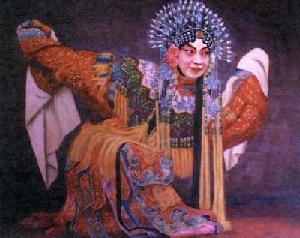
 |
Mei Lanfang (1894-1961), the great master of Peking Opera, made outstanding contributions to the development of the opera and the spread of the beauty of Chinese theatre all over the world.
Mei was born in a Pear Orchard Family,a family that has several generations of operatic performers. When he was little, everybody around thought he was not at all talented in theater like his other family members since he had a little round face and slouchy eyes, but Mei was very diligent and finally made it through hard practice. He started to learn the art of opera when he was a little boy. He made his debut at the age of eleven and became well-known before he reached twenty.
Mei not only inherited the fine traditions of Peking Opera, but also improved it with his own creations. In his 50-year stage career, he played more than one hundred roles which included emperor's concubines, daughters of noble families, female generals, and goddesses. In his performances, he demonstrated the different characters and personalities of these women. He was the first to change the tradition that female characters paid attention only to the art of singing, dancing, expression, and martial arts to develop comprehensive roles.
Mei designed various kinds of dances to help express the character of the role he played. In the operaConqueror Xiang Yu Bids Farewell to His Concubine, he used a sort of sword dance. Through the gentle yet forceful movements of the sword dance, the audience saw the heroine's bravery, gentleness, and loveliness. For the operaThe Fairy Scattering Flowers, Mei designed a sick-ribbon dance based on ancient Buddhist grotto frescoes. With two colorful ribbons tied to his body he danced with the elegance of a fairy flying in the sky. In addition, he created a plate dance, a horsetail whisk dance, a feather dance, and a floral sickle dance.
The representative works of theMeiLanfangSchoolincludes ConquerorXiang Yu Bids Farewell to His Concubine,The Drunken Beauty,A Startling Dream of Wandering through the Garden,Beauty Defies Tyranny,Mu Guiying Takes Command,The Fisherman's Revenge, andPhoenix Raturns to Its Nest.
InThe Drunken Beautystaged in the 1950s,Mei Lanfang plays the lead. The drama tells how one day Imperial Consort Yang throws a banquet at the Hundred Flowers Pavilion for the Tang Dynasty (618-907) Emperor Xuanzong. However, when she is informed that the emperor has gone to see another consort, she makes herself drunk. Mei put a great deal of effort into improving the story for the stage by expressing Consort Yang's unhappiness as a consort out of favor, with such novel tricks as picking up a cup with his mouth, lying down and flopping like fish, and performing drunken steps and fan dances.
Mei Lanfang was the first to introduceErhu, a two-stringed musical instrument, into thePeking Opera orchestra. Today more than sixty years since the introduction,Erhuhas become one of the main orchestral instruments were also used in the accompaniment for Peking Opera.His other stage innovations included changes in hairstyles and color of the costumes used in the opera.
Mei was the first person to introduce Pekjing Operato foreign countries. With his troupe, Mei visitedJapanthree times. During his first visit in 1919, he was praised as an "outstanding performer of the Oriental art". In 1929, Mei and his troupe toured theUnited States. In spite of the Great Depression, all the tickets for the two-week premiere were sold out in only three days. Mei's performances were a great success and theSouthCaliforniaUniversityawarded him the doctor's degree, thus Mei became the first operatic doctor in Chinese history. During his stay in theUnited States, Mei met with the famous motion-picture actor Charles Chaplin and the American singer Paul Robeson. Six years later, Mei introduced the Peking Opera to theSoviet Union.
After the liberation in 1949, Mei once served as director of China Peking Opera Theater, director of the Chinese Opera Research Institute, and vice-chairman of China Federation of Literary and Art Circles.
Besides his autobiography,Forty Years of Life on the Stage, several of his articles and essays have been published inThe Collected Works of Mei Lanfang. His well-known performing items have been published inA Selection of Peking Operas Performed by Mei Lanfang.

Presented by Chinadaily.com.cn Registration Number: 10023870-7
Copyright © Ministry of Culture, P.R.China. All rights reserved